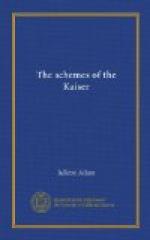In the same spirit as that of the ex-deputy Professor, the whole German and Austrian Press have been demanding that, for the peace of Europe, the German and Austrian troops should be withdrawn from their respective frontiers, so as to compel the Russian forces to do the same.
That is all very well, but inasmuch as the military zones of the Great Russian Empire are separated by enormous distances, and the movement of troops being very much easier for Germany and Austria than for Russia, one would like to know precisely what is the idea at the back of these demands. As soon as ever he returned to Germany, two very significant ideas occurred to William II: one, to make a display of the warmest sentiments for his august pis-aller, the Emperor of Austria; the other, to have his faithful ally Italy play some scurvy trick on France, Russia’s friend.
To this end, the German Emperor proceeded to hold a review of the Austro-Hungarian Fleet and went beyond the official programme by going aboard the ironclad Francis Joseph, flying the flag of Admiral Sterneck. After this, inviting himself to luncheon with the Archduke Charles Stephen, commanding the Austrian squadron, he made a fervent speech, wishing health and glory to his precious ally the Emperor of Austria.
September 27, 1890. [13]
When Germany agreed to withdraw her armies from the soil of France, she replaced them by other soldiers: crossing-sweepers, clerks, workmen, bankers (industrials or “reptiles” as the case might be), as well organised, linked up and drilled as her best troops. Unceasingly, therefore, and without rest, it behoves us to be on our guard and to defend ourselves.
A good many amiable Frenchmen will shrug their shoulders at this, but if we act otherwise we shall be delivered over to our enemies, bound hand and foot, at the psychological moment.
And now, dear reader, to return to William II. You will grant, I think, that since we have followed the interminable zig-zags of his wanderings throughout Europe, we are entitled to coin and utter a new proverb: “A rolling monarch gathers no prestige.”
November 1, 1890. [14]
For mastodons like Bismarck, William II prepares a refrigerating atmosphere which freezes them alive. Splendid mummies like Von Moltke he smothers with flowers. The men whom William dismisses and discards are great men in the eyes of Germany, even though in history they may not be so, because the ex-Chancellor is of inferior character, and because certain successes of Von Moltke were due rather to luck than design. Nevertheless, they are in William’s way and he gets rid of them, by different means. He needs about him men of a different stamp to those of the iron age; for the present, he is satisfied with courtiers, later he will demand valets. All those who are of any worth, all those who stand erect before his shadow, will be sacrificed sooner or later. His autocratic methods will end by producing the same results as those of the most jealous of democracies.




